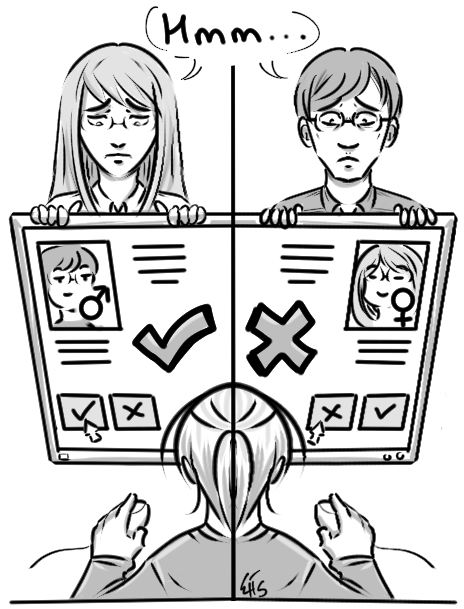
Erin holloway /Technician
Every semester, thousands of students at NC State fill out ratings for their professors. Perhaps even more look at the ratings of their future professors on Rate My Professor, a popular site where anonymous users rank their instructors for everyone to see. NC State researchers are conducting a study to find if a difference exists in how male and female professors are rated at the end of their courses.
It has long been speculated that students will have differing perceptions toward their professors based on gender. Benjamin M. Schmidt, an assistant history professor at Northeastern University created a tool that charts words used to describe instructors on Rate My Professor and sorts them by field and gender. The word “genius” is used to describe males almost twice as often as female professors, whereas the word “bossy” is attributed to females significantly more than their male colleagues.
“There’s still the perception that the true authority figure is a masculine authority figure and students inevitably bring that perception with them because the ultimate authority in our culture is overwhelmingly male,” Deborah A. Hooker, the director of the Women’s and Gender Studies at NC State, said.
Many studies have been carried out to examine a difference in reviews for genders on sites like Rate My Professor and traditional classrooms. When Lillian MacNell, a doctoral candidate in sociology at NC State, came up with her study, she was not primarily focused on gender inequality, but was inspired by her own experience teaching.
“I noticed a lot of student emails challenged my decisions or going over my head to talk to a course instructor,” MacNell said.
MacNell later vented to male colleagues, only to find they had no such problem and students rarely challenged their decisions. While talking with Adam Driscoll, who earned his doctorate degree in sociology at NC State, the idea came up to obscure gender through teaching an online class under a male name.
“At first we joked about her doing an online class as a male to get away from the challenges,” Driscoll said. “We realized we could do it in an analytical sense.”
The research study consisted of one male and female professor teaching the same material for an online class. Each professor used a male name for one group and a female for another. In this way, the interaction with each gender could be examined using the exact same person as some students believed the instructor to be male and others female.
“There’s a number of well-done studies done before on gender bias in the classroom, but they can’t abstract that bias from the actual gender of the professor,” Driscoll said.
With the only difference being the students’ perception of the instructor’s gender, differences could be observed in a controlled environment. Upon completion of the course, the students rated their instructor using a 1-5 scale of their traits.
The results yielded higher rankings for a perceived male instructor, regardless of their gender for all traits. While this points to a bias against female instructors, the sample size study was only able to cover 43 students.
“The results are interesting and important, but we do see this as a pilot study,” MacNell said.
It had always been a challenge to study gender in a classroom as even when comparing male and female professors, studies were still comparing two different teaching styles along with the gender. The research model used in the study is a cleaner method as the interaction would be genuinely with the same instructor with the only difference being gender perception.
It also stands out by producing numerical, quantitative results with aggregated scores of instructors in a field were qualitative results are prevalent.
With the paper, “What’s in a Name: Exposing Gender Bias in Student Ratings of Teaching,” now published in the Innovative Higher Education journal, MacNell hopes to carry out further studies in more courses to gain a greater perspective on the issue.
“It is a small study and I hope bigger ones are carried out because of it,” MacNell said.